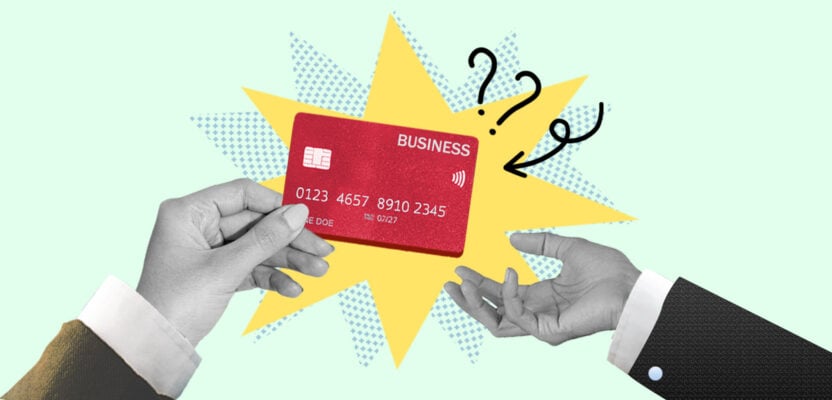A business credit card is a great resource, whether you have a full-scale operation or a side-hustle. Business credit cards usually offer higher credit limits than personal cards, and they’re the perfect tool for building your business credit score.
Regardless of whether you’re getting a credit card for freelancers or a credit card for your new startup, you need to meet certain requirements and follow a few steps to lock down your new business credit line.
Table of Contents
Should I apply for a business credit card?
Yes, you should get a business credit card if you run any type of business—no matter what size or type.
The benefits of getting a business credit card include:
- Separating your personal and business finances (which protects your personal assets if someone ever sues your business)
- Building your business credit
- Having a higher credit limit to put towards business expenses
- Making tax filing easier
- Preventing you from accumulating too much credit card debt
Can you use your personal credit card for business expenses?
Using your personal credit cards for business expenses is perfectly legal, but it’s not the best idea. Business and personal credit cards are different, as are your business and personal credit.
Separating the two will streamline your finances and build a better financial foundation for your business operations, as well as protecting your personal assets.
How to apply for a business credit card
To open a credit card for your business, follow these five steps:
1. Check your credit score
Similar to when you apply for a personal credit card, you should always start your card hunt with a self-credit check.
You’ll need to look up:
- Your business credit score: If you have a business credit score—which you might not, if this is the first line of credit you’ve taken out with this company—you need to check it. You can get your score from the three main credit bureaus that produce credit reports (Experian, Equifax, and TransUnion). Your business credit score might cost money to access.
- Your personal credit score: Even though your personal and business credit are separate, when you apply for a business credit card, your lender will check your personal credit score as well. You can check your score on the credit bureaus’ websites (and potentially in other places as well, such as your bank’s online portal). You’ll probably be able to get your personal credit score for free.
Having a good idea of where both your scores stand (or just your personal score if this is your first line of business credit) will help you determine which credit cards you can apply for and what borrowing terms you can expect, including your potential credit limit and credit card APR.
2. Explore your options and identify the best credit card for your business
There are tons of business credit cards on the market, so you have plenty of choices. While your range of options will be determined by your credit score, you still need to decide which type of card fits your business needs.
For example:
- If you often travel internationally for work, consider a credit card with a rewards miles program and no foreign transaction fees.
- If you drive frequently for work, prioritize options that offer credit card points for gas.
- If you’re opening a new business and are feeling overwhelmed by startup costs, look into a 0% APR credit card to help you pay off those hefty initial expenses without accruing interest.
- If you have multiple employees who will need to use the card, make sure you get a credit card that allows authorized users, ideally without extra fees.
As when shopping for a personal credit card, make sure you check each potential credit card’s Schumer Box, where you can find a full breakdown of its rates, fees, and borrowing terms.
3. Check the application requirements
Once you’ve found a card that makes sense for your business, read through the application requirements before officially submitting your own.
The application requirements will vary based on the credit card lender. You can generally expect to provide the following details in your application:
Business information
- Business name
- Description of your business’s structure
- Business age
- Revenue
- Address
- Expected expenses
- Employee count
Personal details
- Your own income
- Contact information
We’ll discuss these requirements in more detail below.
Before you commit to applying, see if your issuer provides guidelines on what kind of revenue and credit score they expect to see. Only go through with your application if it has a reasonable chance of success.
When you apply for a credit card, the lender will perform a hard inquiry, which takes a few points off your credit score. This means it’s important to do your research before submitting applications so you don’t hurt your credit score in vain.
4. Submit your business credit card application and wait for approval
Once you’ve chosen your card and gathered the necessary application information, it’s time to apply. You can do so:
- Online
- Over the phone
- In person, at the credit card’s issuing bank
Once you submit your materials, all you have to do is wait to find out if your application was successful.
How long will you have to wait after applying?
Regardless of how you apply, it’s possible you’ll get an immediate decision if you’re approved for your business credit card.
However, how long it’ll take to get the credit card depends on whether the lender needs to verify your information. If so, you’ll need to wait up to 10 days for a decision.
5. Activate your card and use it wisely
Assuming your application is approved, your new business credit card will be mailed to you. You can expect to wait 7–14 business days to get your card.
Once you’ve received it, call the number on the back or follow the online instructions to activate it, which you have to do before you can start using it. Be sure to set up a PIN promptly so you can get cash from your credit card at an ATM if an emergency arises.
Use your card responsibly by only charging business expenses to it and paying your credit card bill on time each month. Once you’ve built up your business credit through responsible borrowing, you can try to apply for an even better business credit card.
10 business credit card requirements
As mentioned, the requirements for qualifying for a business credit card vary by credit card issuer, but you should generally expect to provide the following:
1. Your business’s legal name
You must provide the name under which your business is registered in your state. However, if you operate as a sole proprietorship or general partnership, you only need to provide your own legal name.
2. Your business’s contact information
Provide the email address, mailing address (not a P.O. Box), and phone number with which you registered your business.
3. Business industry
Your credit card issuer may or may not ask what industry your business is in (if you apply online, they may provide a dropdown menu with common industries). Select the option most closely related to your field, or fill in your own answer if possible.
4. Business structure
You’ll be asked to specify your business structure, which can be a:
- Limited liability company (LLC)
- Sole proprietorship
- Corporation
- Partnership
- Non-profit
- Co-operative
You may also need to add other structural details, such as whether you operate as a C corp or S corp.
Furthermore, if you run a partnership or other joint venture, you’ll likely be asked to provide details about your partner (including their name, contact information, identification numbers, and percent ownership).
5. Number of years in business and number of employees
You’ll be asked how many years your business has been in operation and how many employees you have. If your company is brand new, choose the lowest amount of time on the form.
Don’t worry if you’re a sole proprietor or single-employee LLC; write down that you have just one employee (yourself).
6. Annual business revenue and income, and estimated monthly spending
You’ll almost certainly be asked for details regarding your estimated revenue and spending. Even if your business doesn’t yet generate revenue, you’ll be asked for your personal income as well, so your qualification and credit limit will likely be based on this.
Furthermore, you’ll provide your estimated monthly expenses. Your lender will use this information to estimate your debt-to-income ratio.
7. Federal Tax ID
You’ll need to provide a form of federal tax ID. Many credit card issuers will first ask for your business’s Employee Identification Number (EIN).
You can still get a business credit card even if you don’t have an EIN, but you’ll need to provide your personal Social Security number (SSN) or Individual Taxpayer Identification Number (ITIN) instead.
8. Your legal name, contact information, and Social Security number
No matter what business credit card you’re applying for, you’ll need to provide your personal information so the issuer can verify your identity and look into your credit history.
If you don’t have a Social Security number or an EIN due to your citizenship status, you can request an ITIN through the IRS. You’ll need to provide a W-7, proof of identity, and foreign status documentation. 2
9. Your personal credit history
After you provide your personal details, the credit card issuer will use them to check your credit history. They may check both your business credit score and your personal credit score. To get an unsecured business credit card, you’ll likely need a credit score of 650 or higher.
How much weight is put on your personal credit score will depend on whether you have a business credit score and how established it is.
10. Personal guarantee
Most credit card issuers will require you or someone else to act as a guarantor for your business credit card. This means that if your business fails to pay your credit card bills, the guarantor (you, most likely) will be personally responsible.
If you want to avoid being a guarantor, look for business credit cards that don’t have this requirement or consider applying for a card issued by a bank you already have a good relationship with. If you’ve proven that you’re a responsible borrower, they might not request a guarantor for your new card.
Is it hard to get a business credit card?
No, it’s not hard to get a business credit card if you meet the requirements above.
As mentioned, you can get a card without an EIN, and it’s possible to get one even if your personal credit score falls on the lower end of the credit score range.
As long as you’re self-employed in some capacity—even if it isn’t your main source of income—you can get a business credit card.






